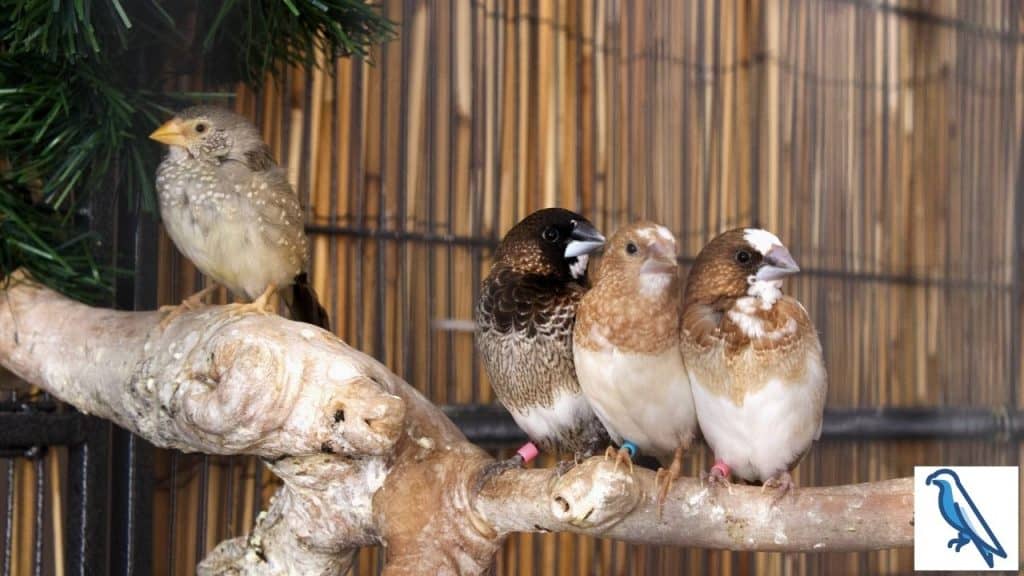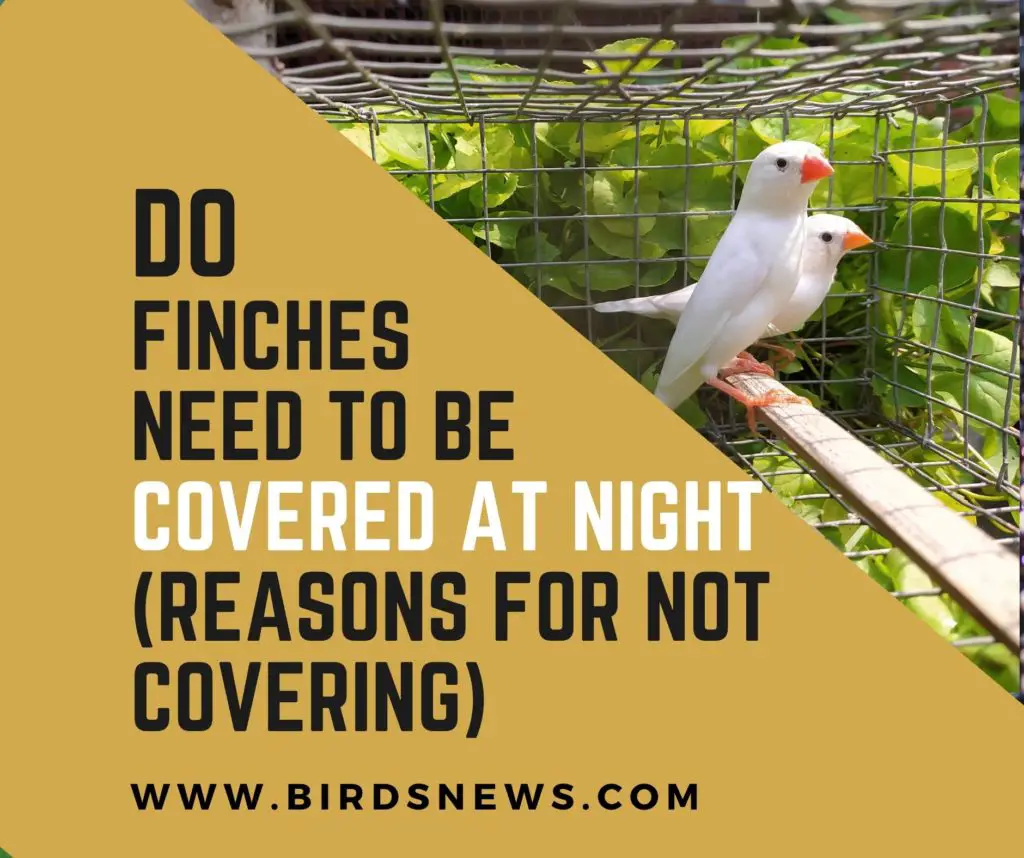In wild or captivity, finches need proper nutrition, rest, and a stress-free environment to survive. Any intermittent risk coming from predators, bad weather, and changing ecosystems can impact their lives. So, how long do finches live?
Finches have an average lifespan of 4 to 7 years. However, they live longer in captivity as they don’t encounter similar stress and hazard faced by finches in the wild. By providing suitable living conditions, good nutrition, and adequate health care, we can amplify their possibilities of survival.
Wow! The life span of any species depends on various factors and conditions. By offering suitable living conditions, you can increase your pet bird’s life expectancy. Let us now explore how long do finches live in the wild and captivity?

How Long Do Finches Live In Wild And In Captivity?
According to the American Birds Conservancy, European Goldfinches can live till the age of 27 years. However, the average life span of most finches in the wild is 4 to 7 years.
The prime reason is that wild finches are continuously exposed to stress and hazards from predators and the environment.
In captivity, most bird species have improved lifespan. Although, some people may find it cruel to cage birds.
The fact remains, if you can provide appropriate living conditions to your pet finches, they can outlive their counterparts in the wild. Some finches have lived between 12 to 20 years in captivity.
Alright! Now that you know better living conditions and a nutritious diet, helps finches in captivity live longer than their counterparts in the wild.
Let us also check out other reasons or factors that can impact a finch’s health.
Interesting Further Reading:
- Do Finches Like Music? + Are Finches Happy When They Sing?
- Why Do Finches Puff Up? (What Are The Possible Reasons)
- What Do Finches Eat? + Do Finches Eat Fruits & Veggies?
What Factors Affect Finch’s Health?
Better health increases longevity. Although it may be true, it always does not apply in the wild. A healthy finch can die early in the wild due to the continuous stress and hazards it endures.
Let us look at different conditions finches face in the wild, which impact their lives.
- Availability of food: In the wild, finches have to forage every day for food. During winter, food can become scarce in their natural habitat, and they may have to cover more distance or migrate to another place. It means they spend more time looking for food and can quickly become prey to predatory birds.
- Migration: Many birds, including finches, migrate from one habitat to another. Due to the harsh climate or scarcity of food, it forces them to move to abundant habitats. However, such migrations are never easy, and many birds are unable to complete the journey and end up in rivers, lakes, and oceans.
- Bad weather: Birds can predict bad weather and take refuge for safety. At times, weather can be destructive and lead to a shortage of food for the small finches. Many sick finches become vulnerable and may die without food.
- Predators: Wild finches need to stay alert at all times. It is impossible to predict dangers that may be lurking around. Although they are safe in their hideouts, they have to come out to feed and, at times, become food for the predators.
Hmmm! It’s a tough life in the wild because of the uncertainties surrounding them. But do pet finches in captivity come across any health hazards.
Please understand we are assuming that as finch lovers and breeders, you will take care of their essential needs of adequate space and nourishing food.
Let us now explore different health problems that pet finches come across in captivity.
- Aspergillosis: It is a fungal infection that leads to respiratory problems. Pet birds that are kept only on a seed diet are more prone to this disease. The Aspergillus fungus is found everywhere in the form of microscopic spores and is resistant to disinfection. They can easily thrive in soil, damp nesting material in the aviary, and on moldy foods.
- Eye Infection: It is common for house finches to have avian conjunctivitis, a type of eye infection. Don’t turn a blind eye if you see your pet finch awkwardly scratching its eye against its foot or any other object. Timely treatment is the key to help your pet recover from such an infection.
- Calcium deficiency: Typically, the food finches eat has lower calcium levels required to support healthy growth. In females, after laying eggs, female finches need to refill the calcium lost in the process.
- Loose Droppings: An ill bird will commonly have a change in its droppings. Pet owners need to be familiar with your finch’s droppings. Suppose you observe any change in the color, texture, volume, and frequency. It is an indication of some problem with your pet finch and needs immediate medical attention.
- Egg binding: It is when an egg takes longer to pass out of the reproductive tract. It mostly happens with smaller birds like finches, canaries, parakeets, and cockatiels. Older female finches will be more vulnerable to egg binding, and it can be fatal. You must be careful and seek immediate help from your avian vet.
- Bumblefoot: It is a condition where infection can cause inflammation to the sole of the bird. It is vital to treat it quickly, or else it may inflict significant damage to the leg. There are instances where the leg needs to be amputated to save the pet bird.
- Fractures and other injuries: Wild birds are more prone to injuries. It is observed that even birds in small aviaries can get injured by colliding with an object while flying inside the cage. If you observe your pet finch in stress or has a problem in movement or balancing, provide necessary health care.
- Overgrown claws: In captivity, finches can’t land on rough objects on the ground or soil searching for food that automatically wears down their claws. Overgrown claws can also be due to calcium deficiency. It can create a problem for the pet finch while perching.
Okay! Now that you know the challenges or problems finches face in the wild and captivity.
Let us also find out how as pet owners, you can help your pet finches have a comfortable and long life.
How Can You Help Your Finches Live Longer?
In the earlier section, we have discussed the factors that impact the life of finches in the wild and captivity.
You cannot do much as pet owners to increase the life span of finches in the wild.
However, by staying vigilant, you can identify any problems your pet bird may have encountered and take timely action to increase their chances of survival.
Let us understand what you as pet owners can do to improve the quality and their life span.
- Isolate sick finch: It is advisable to move your sick finch to another cage. Provide fresh and clean water. You may also add honey to encourage it to drink water. If it does not drink water on its own, take it to the avian vet. It is essential to clean the cage and replace sweetened water to prevent bacterial growth.
- Good hygiene: It is necessary to ensure there is no dust and moisture build-up in your finch cage. Frequent cage cleaning with soap water is necessary. Besides cleaning, proper ventilation will ensure the cage remains dry and prevents any molds and fungus from growing.
- Introduce eggs in their meal: You may help your pet finches replenish their calcium need by adding sliced boiled eggs in their meal. Some people only serve egg white to their pet birds. Eggs will supplement the calcium level in your pet finches.
- Avoid bumpy perches: Perches are essential as your pet finch needs to sit on. It is essential to select perches that are leveled and without bumps. You don’t want to hurt your pet finch while it lands on perches installed inside the cage, as any bruise or injury may lead to infection.
- Decent cage size: As pet owners, ensure the cage size is big enough for the number of finch pairs you want to breed. Besides the size, be mindful about installing perches and toys at places that don’t obstruct the path of your pet finch while flying. You want your pet finches to remain active to stay healthy.
- Groom your finch: You can groom your bird by bathing it once every two weeks. Kindly use lukewarm or room temperature water for bathing. You may also take them to an avian vet to trim their overgrown claws and beaks.
Besides the above, you have to provide them fresh and clean water, a good mix of dietary food with high nutritional value based on what’s available in your location.
Alright! It looks easy but will need your commitment and dedication to provide them a quality lifestyle necessary for healthy living.
Recommended Further Reading:
- Do Finches Lay Unfertilized Eggs? (What Happens To Unfertilized Finch Egg?)
- Do Zebra Finches Smell Bad? + Are Zebra Finches Messy Birds?
- Can Finches Be Trained? + Are Finches Easy To Train?
- Do Finches Have Good Eyesight? (Do Finches Have Good Vision At Night?)
Related Questions

Hi, There and Welcome to BirdsNews.com, is here to help you learn and care about pet birds. and this blog is a journal of everything I’ve learned.








